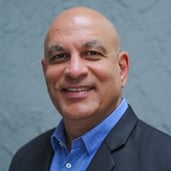Carl Chinoy packs a lot into his professional and personal life: CEO, CIO, global tech executive. Chef and cooking instructor. Soccer player, avid soccer fan and a second-degree black belt in judo. World traveler. Volunteer.
On his personal website, Chinoy identifies himself as “problem-solver.”
Given that long list, it is no wonder that Chinoy seeks out opportunities that involve change and transformation, where he can draw on his varied professional experiences and personal accomplishments to tackle challenges and push organizations to the next level.
As CEO of Tech Ahura LLC, a consulting company he started in 2016, Chinoy takes leadership posts in companies which are on transformation journeys. For example, he has served since January 2022 as VP of Platform Development and Executive Consultant to the CIO at Stride Inc., an EdTech company that provides online and blended education programs.
“I do not provide just PowerPoint slides. I provide the day-to-day grunt work of leading change and implementing initiatives, process changes and process improvements,” he says.
Prior to starting his company, Chinoy held multiple executive positions, including CIO and COO, in numerous companies and served as a senior manager with two consulting firms.
He spoke in February 2024 for the My CIO Career series about his decision to start his own company, his passion for change, and the importance of personal pursuits.
Mary K. Pratt: Why did you start this company?

Carl Chinoy: I wanted to find the right opportunities.
I am interested in working in organizations where huge change is occurring, and I want to participate in the growth of the organization as well.
I am at a point in my career where titles do not matter to me, as long as the work that I am doing is providing a growth engine to the organization. If the IT organization plays a critical role as a prominent growth engine for the organization, that is exciting to me.
And I learned that I could find more opportunities to do that kind of work through a consulting kind of organization.
Also, I personally like change, meaning I like moving from one organization to another. It provides me with brand new challenges.
You worked in consulting earlier in your career, spending many years first with Ernst & Young and then Deloitte. That is not a common background among CIOs. What did you take away from that experience?
That experience was a big positive.
I would learn in one or two years as a consultant what would have taken me 10 years to learn in the industry – as we called it – because I was moving from one client to another and I was facing all the challenges that all the clients were facing. That required me to be constantly learning and faster at developing solutions, always a couple steps ahead of the client.
I learned how to develop a road map, I learned how to develop business cases and then follow up on those business cases so that clients would get the full benefits of the initiatives.
I learned about taking risks and being able to deal with ambiguity.
And I had the opportunity to be part of starting something brand new, for example, when I helped start the Ernst & Young India practice in the 1990s.
Working at the Big 5 also helped me hone my advisory skills. That is extremely important, because advising is a larger part of the CIO role today; the CIO is advising the CEO and others about technology and improvements and so on.
Do you think aspiring CIOs should seek out that kind of experience?
To succeed as a CIO you must understand the various parts of the business.
So I think organizations, when succession planning and looking at individuals who could serve as a CIO, should find opportunities for them to try out various jobs within the organization to gain those kinds of experiences.
And IT professionals should develop a network of other executives and participate in professional organizations to gain a better understanding of the business.
You spoke about “the grunt work of doing transformation.” Can you give me an example of what you mean by that?
Transformation is about fundamentally changing an organization.
However, before you decide what needs to change, you have to understand the organization’s current issues – whether it is a challenge with speed to market, or understanding customer expectations, or IT keeping pace with the rest of the organization.
Once the CIO understands the challenges, then the grunt work comes in.
I worked at Caesars Entertainment Corporation for two years, from February 2018 to January 2020, providing strategic leadership and operations expertise to the global CIO.
We sought to understand what the problems were before we started on the transformation journey.
We found that there were issues around knowing IT organizations current capacity to deliver work; we could not figure out how many hours of work was being done by this very large, thousand-person organization. So we first had to figure out what the current capacity of the organization was so we adequately do forecasting of work.
Once we determined capacity, we saw that the demand for services was so much bigger than current capacity.
Then we had to determine how IT could work at a larger scale and work more efficiently to meet demand and manage costs adequately.
That was when we decided to embark on a transformation journey. We implemented artificial intelligence tools, orchestration tools and automation to create capacity and perform some labor-intensive work, all of which created additional capacity for innovation and value-added services that IT could now perform efficiently and at a larger scale.
That is what I am talking about when I say grunt work.
Which do you feel are more important to succeed as a CIO: technical skills or business skills?
CIOs need non-technical skills, because much of the transformation effort is more procedural and process oriented than technical. For example, if the help desk gets a phone call from a user having an issue and it takes IT five days to respond, then that customer – whether it is an external customer or an internal user – will be dissatisfied. If it is an external customer, that customer will move to a competitor so then you are losing revenue. That is a procedural issue, not a pure technology challenge.
But CIOs also need technology skills so they can apply the right technology to solve problems. Personally, I grew up in the IT space. I was a developer. I was a guy who was writing code. But I recognize that it is not enough to understand the cloud, AI, machine learning and those kinds of things only. I also must understand how those technologies can be utilized in the organization to solve business challenges. So I think the predominant skill that a successful CIOs must have is knowing how to apply technology to solve business problems.
Not everyone has that. Many times young executives cannot understand the issue which is standing in front of them; they cannot recognize it. So they try to implement various technologies, and they do not succeed because they do not understand the real issue.
|
Related article: How Shawn Harrs, CIO at Red Lobster, Developed a Template for IT Success By Mary K. Pratt |
Has your experience in sports influenced how you approach your work?
Definitely.
In a soccer match there are 11 players on the field, and all 11 players have a very specific role, a specific position and a specific task to do. They all have jobs to be done. That is something which is important in professional life as well, meaning everybody on the team has a role and is required on the team, to and the capability to work together as a team are all important aspects to make a winning team.
On the other hand judo is an individual sport; you win or lose based upon your own capabilities and skills. If you throw the guy, you throw the guy and win the match. Everybody sees it, and there is no ambiguity to that win. So you have to take responsibility, and you have to bear that responsibility and you have to build your own skills. That is true for executives, too: build your own skills and take responsibility.
You have your own website. Why?
I created it many years back, and I have kept it updated as much as I can. It is a lot of effort, and I think LinkedIn is a much better site for a professional profile. I am probably never going to be offered a job because somebody went to carlchinoy.com; that is more likely to happen through LinkedIn. But having my own website is a good conversation-starter. And it is something which gives me joy. That is the big reason for having it.
How did you get into cooking?
My wife and I are foodies. We love to eat different kinds of foods. I like to cook, and I enjoy teaching. I teach Mediterranean cooking, all kinds of Indian dishes and other styles of cooking. I have cooked a lot of South American dishes, too. I am not a professional chef, but if I eat something, if I can smell it and taste it, then I probably will be able to figure out how to make it.
What have you learned from your numerous and varied professional and personal pursuits?
Show up for the game. That is very important personally and professionally.
Many times people hold themselves back and do not show up for the game because they think that they will not succeed or that they are not good enough or whatever.
But it is important to just show up, be there, and take that risk.
I had a conversation many years back with a man who had climbed Mount Everest, and he climbed it without the assistance of supplemental oxygen. He talked about how there is no other way to climb the mountain except by taking one step ahead of the other.
That is true in transformation, for careers and for all kinds of work: You have to just take that one step and keep on doing it so you will get to your destination.

Written by Mary K. Pratt
Mary K. Pratt is an award-winning journalist who currently writes about enterprise IT and cybersecurity strategy and management topics. Her work has appeared in numerous publications, including CIO, CSO, Computerworld and The Wall Street Journal.



